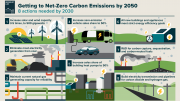
Carbon-offset projects have overstated their climate benefits and struggle to deliver on their “promised land” — of ton-for-ton emissions compensation. Credit: KyotoU Global Comms/Jake Tobiyama
Investigating Big Oil’s position in the quest for net-zero emissions.
Commitments to reduce greenhouse gas emissions are complex and multifaceted. Are major oil corporations — the majors — genuinely shifting from fossil fuels to more eco-friendly energy sources, or are they simply engaging in a strategic game with carbon credits?
For the first time, a global research team headed by Kyoto University has explored the transition and carbon-offset strategies of these major oil companies. A database created for the project has been made publicly available to enhance the study’s transparency.
“To measure each major’s intent to transition, we applied indicators of their plans to phase out their supply of oil and gas and take responsibility for all lifecycle emissions,” says Gregory Trencher of Kyoto University’s Graduate School of Environmental Studies, referring to current clean energy investments that merely complement — not replace — fossil fuels.
Trencher’s team investigated the behaviors of BP, Shell, Chevron, and ExxonMobil using a two-tiered analysis:
1. Net-zero strategy: How does each major’s net-zero plans for 2050 differ with respect to the scope of emissions covered, plans to downscale fossil-fuel production, and reliance on offsets?
2. Offsetting behavior: What kinds of offsets are leveraged for decarbonization and profit generation? How are offsets linked to core business activities?
In addition, unlike other studies that have focused on plans to increase clean energy sources, Trencher’s team has conducted an extensive analysis of the majors’ offsetting behavior. With net-zero, a company can purchase carbon credits from projects in developing countries, such as forest conservation energy, to claim it has reduced its own emissions.
The team reached two main conclusions from the two tiers of analysis, combining data obtained from each major’s annual and sustainability reports and websites with offsetting data from the voluntary carbon market:
First, “Net-zero pledges by oil majors do not encompass a business-model transformation away from fossil fuels,” comments coauthor Mathieu Blondeel of Vrije University Amsterdam. Absent are clear plans to curb both the production and sales of hydrocarbons and — by a reliance on carbon offsets — to reach net-zero emissions and decarbonize conventional energy products.
Second, “Our results point to questionable climate benefits for offsets,” adds Tohoku University coauthor Jusen Asuka, suggesting that most offset projects and carbon credits the majors use are for avoiding emissions rather than for physically removing emissions from the atmosphere.
These two findings challenge the authenticity of claims from the majors that have pledged to reach net-zero emissions by 2050 while transitioning to clean energy. Achieving this requires a dual-transformative process where hydrocarbon production is progressively downscaled and then eliminated at the same time that clean energy is rapidly scaled up.
“The majors tend to claim that ordinary fossil fuels are carbon-neutral by using carbon offsets to fast-track their progress towards net-zero targets,” remarks Trencher.
“This is problematic,” the lead author adds, pointing out that historical and recent evidence shows that many carbon-offset projects have overstated their climate benefits and are “unable to deliver on their promised ton-for-ton emissions compensation.”
“Moreover,” concludes Trencher, “with many credits coming from aged avoidance projects, our dataset shows that many offset projects do not support the physical removal of carbon emissions from the atmosphere today.”
Reference: “Do all roads lead to Paris?” by Gregory Trencher, Mathieu Blondeel and Jusen Asuka, 20 June 2023, Climatic Change.
DOI: 10.1007/s10584-023-03564-7
The study was funded by the Japan Society for the Promotion of Science and the UK Energy Research Centre.









Asking a leading question, implying guilt, is not unlike the question, “Have you stopped beating your wife?” It is not good science. It is, rather, a form of politics where one impugns their opponent by implying something for which they don’t have good evidence. A scientific study should just present the evidence for their hypothesis, and let the conclusion stand on the evidence presented. Interpretation is open to interpretation and discussion, which is why studies are published in journals, thereby allowing exposure and analysis by the researcher’s peers. This “transparent” study may have good evidence. However, I’m disinclined to take the time to read it given the way it has been written.
I’ve always been dubious of the purchase of offsets as a way of actually reducing something considered harmful. I’ve always seen it to be more akin to religious indulgences where the wealthy can continue to sin.